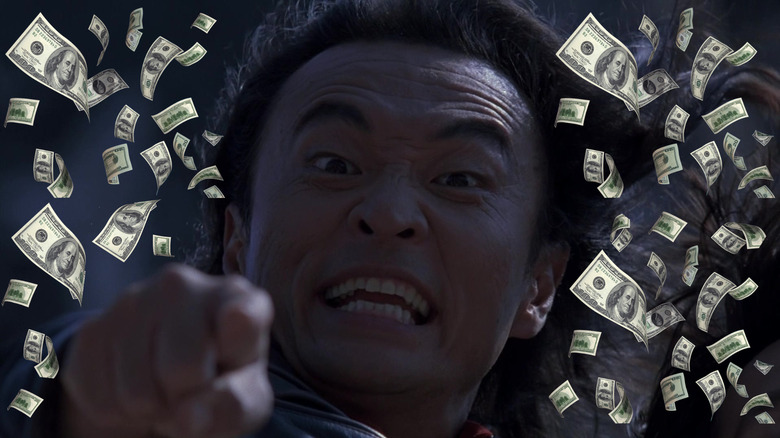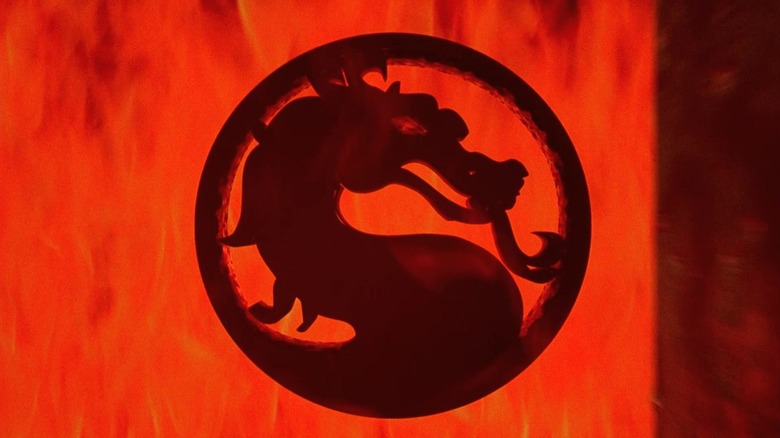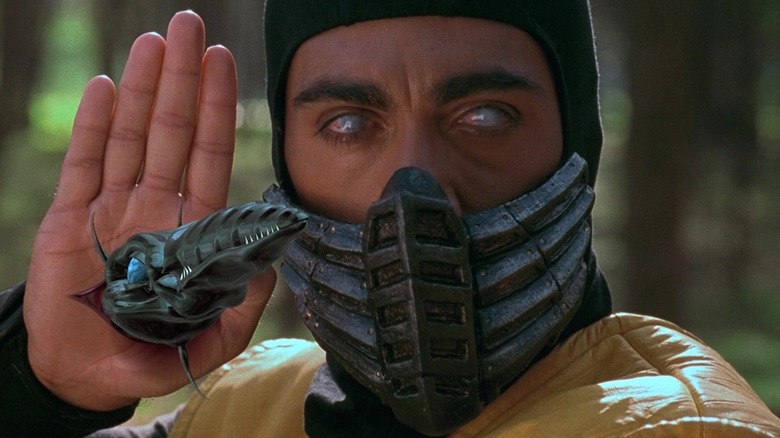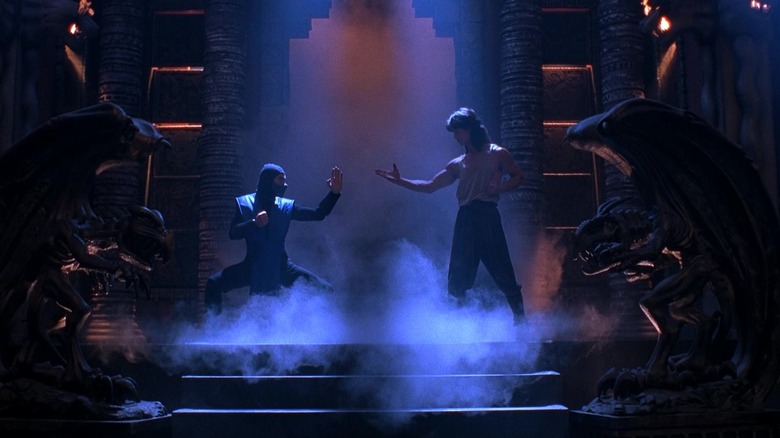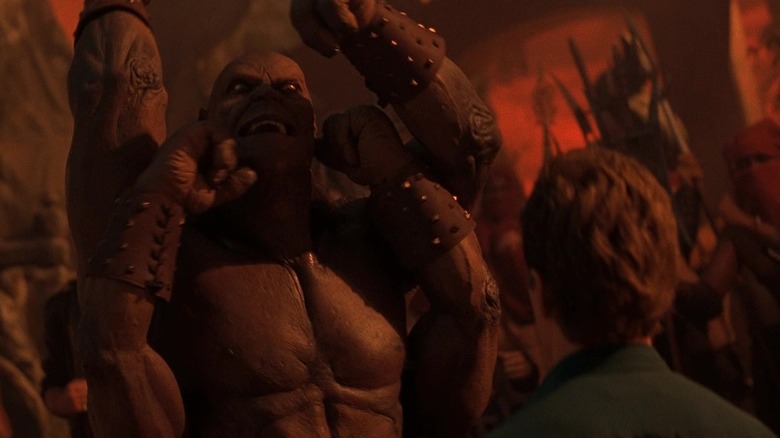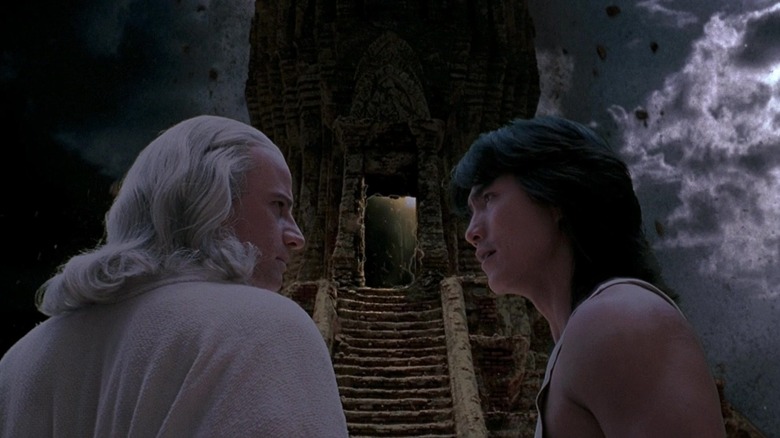Mortal Kombat Was A Box Office Hit That Doomed Video Game Movies For Decades
(Welcome to Tales from the Box Office, our column that examines box office miracles, disasters, and everything in between, as well as what we can learn from them.)
"They think it will be the biggest movie they've ever released." Those are the words of producer Larry Kasanoff speaking in early 1995 about "Mortal Kombat" to Electronic Gaming Monthly. "The studio feels that the MK movie will be a summer smash." At the time, the New Line Cinema adaptation of the wildly popular, controversial fighting game was shrouded in mystery and rumor. Kasanoff was trying to set the record straight; they didn't have a stinker on their hands — they had a hit. 30 years later, this is a prime example of how two things can be true at once.
New Line, dubbed "the house that Freddy built" thanks to the success of the "A Nightmare on Elm Street" franchise, was indeed confident. They delayed the original release, shifting it to summer, and even gave then-untested director Paul W.S. Anderson a bigger budget for the special effects. The result? A cheesy avalanche of flying fists and special effects that have aged like milk in the hot sun. It was also a big hit movie, one that would set an unfortunate precedent for video game movies for decades to come.
In this week's Tales from the Box Office, we're looking back at the original "Mortal Kombat" movie in honor of its 30th anniversary. We'll go over how it came to be, why it was a risky proposition, how Anderson weaseled his way into the job, what happened when it hit theaters, what happened in the aftermath of its release, and what we can learn from it all these years later. Let's dig in, shall we?
The movie: Mortal Kombat (1995)
In the film, three warriors must overcome seemingly insurmountable odds to save Earth from the evil sorcerer Shang Tusung. For nine generations, he has been victorious in hand-to-hand battles against his mortal enemies, and if he wins a tenth Mortal Kombat tournament, he will reign over the multiverse forever. Let the games begin.
Let's rewind the clock. In the late '80s and early '90s, the console wars between Nintendo and Sega were well underway. Video games were having a big moment. "Mortal Kombat" was created by Ed Boon and John Tobias, debuting in arcades in 1992. It made a big splash very quickly. From its over-the-top gore to its distinctive characters, it was becoming a hit.
Things changed when Acclaim got the rights to bring the game to consoles, opening it up to a whole new audience. It also brought with it a great deal of controversy. Speaking to Gamespot in 2007, Jeff Greeson, then editor in chief of the fansite The Realm of Mortal Kombat, distilled the controversy that was swirling around the game in the early '90s:
"The media picked up on the fears that the public had of bringing such violent imagery into their homes through a device that children played with ... When you pinpoint and highlight the game's violence and nothing else, it was hard to be a defender of the game during that time."
Video games were booming in 1995. Video game movies were not
Another very important thing to point out is that video games were having a moment around this time. Video game movies? Not so much. 1993's "Super Mario Bros." was a straight-up financial disaster, and though it has achieved some sort of cult status amongst those who grew up in the '90s, nobody could accuse it of being a good movie. So it's not as though making a movie based on a very popular video game was a surefire bet.
That having been said, the controversy surrounding "Mortal Kombat" made it a household name, even for those who were never going to play the game. That's in part why Kasanoff saw an opportunity to capitalize. Speaking in 2015, the game's co-creator Ed Boon revealed that he had his doubts at first:
"When the movie was being discussed, I remember not taking it seriously at first. I thought, 'This is probably going to be talked about but not happen.' Then all of a sudden we were getting phone calls about casting and they were saying, 'What about this guy for this character? What about this guy for that character?' I remember them saying, 'What do you think of Danny Glover as Raiden?'"
Kasanoff and New Line were, indeed, serious. They put together a cast, one that didn't include Danny Glover. But it did include Christopher Lambert ("Highlander") as Lord Raiden, Bridgette Wilson ("Shopgirl") as Sonya Blade, Linden Ashby ("Wyatt Earp") as Johnny Cage, Robin Shou ("The Most Wanted") as Liu Kang, Talisa Soto ("Don Juan DeMarco") as Kitana, and Cary-Hiroyuki Tagawa ("Licence to Kill") as Shang Tsung.
The Mortal Kombat movie came together behind the scenes
The directing gig would ultimately go to Paul W.S. Anderson, working from a script by Kevin Droney. The world would come to know Anderson as the director of the $1.2 billion "Resident Evil" franchise. At the time, he had only his low-budget feature debut "Shopping" to his name. Still, he managed to bluff his way into the gig anyway.
A big part of that had to do with his approach to the pitch process. This would be an effects-heavy movie, making use of CGI tech that was pioneered in Steven Spielberg's "Jurassic Park" just a couple of years earlier. Anderson, speaking in 2015, explained how he managed to win the job.
"I had no experience with visual effects, so I went to Samuel French's book store and I bought every single book I could find on visual effects, on matte paintings, on CGI. I had the jargon down. It sounded like I knew more about CG than anyone else in Hollywood, even though I'd never been into a visual effects house. I kind of bluffed my way in, but I think they could see the enthusiasm."
His adaptation included, among other things, a very expensive animatronic version of Goro and more than a little CGI. Put delicately, it didn't all look great. The Reptile scenes are particularly rough. Still, the young director managed to deliver a movie that New Line had a great deal of confidence in. The studio's confidence was by no means unfounded; it turned out.
The financial journey
New Line marketed the hell out of the movie, with a real "kapow" vibe to the trailers, as well as the unforgettable beats provided by The Immortals in the form of "Techno Syndrome," which would become the "Mortal Kombat" theme. Be it the impossibly catchy song or the guy yelling "MORTAL KOMBAT!" at the top of his lungs, the whole thing caught on in the mainstream.
"Mortal Kombat" hit theaters on the weekend of August 18, 1995, and it proved to be a brilliant move by the studio. It debuted at number one with $23.2 million, easily topping the charts as the only other newcomer that week was "The Baby-Sitters Club" ($3.4 million), debuting at number nine. Against a reported budget in the $20 million range, it was a home run. Even as the likes of Robert Rodriguez's "Desperado," "Dangerous Minds," and "The Prophecy" arrived in the following weeks, Anderson's video game adaptation held strong, topping the charts for three weekends straight.
When all was said and done, "Mortal Kombat" finished its original theatrical run with $70.4 million domestically to go with an then-impressive $51.7 million overseas for a total of $122.1 million worldwide. Or roughly six times the production budget. As a bonus, the movie's soundtrack eventually earned platinum status.
New Line moved quickly on a sequel, which would arrive in the form of 1997's "Mortal Kombat: Annihilation," which some might say earns so-bad-it's-good status. Anderson didn't return, nor did most of the cast. It was met with no love from critics and barely cleared $50 million at the box office, killing plans for a third installment.
Mortal Kombat left behind a complicated legacy
Despite the franchise flaming out, it was hard to deny that the venture was a major success. Kasanoff's instincts as a producer were correct, and "Mortal Kombat" had become a full-blown multimedia franchise, with not one but two TV shows following in its wake, including the animated "Mortal Kombat: Defenders of the Realm" and the live-action "Mortal Kombat: Conquest." Neither of them were well-received.
Hollywood, as it tends to do, followed the money. Many more video game movies followed, most of which were very bad. Even the successes like "Resident Evil" were far from critical darlings, and those successes were muted. Achieving true blockbuster status remained elusive, and, in most cases, fans of the games themselves weren't exactly happy with the adaptations.
To that end, New Line worked very hard to get "Mortal Kombat" into theaters with a PG-13 rating, which in many ways flew in the face of the R-rated nature of the games themselves. It was just one of many decisions that helped make the movie what it was, both a big hit and a very unserious affair.
At the same time, because Hollywood simply couldn't crack the code on making a video game movie that people roundly enjoyed, it remained the highest-rated video game adaptation on Rotten Tomatoes for years. It was the best of the worst, would be one way to look at it. It's only truly in the last handful of years that the tide has truly turned, thanks to movies like "Sonic the Hedgehog" and "Detective Pikachu" leading the way.
The lessons contained within
In the years since, the franchise has continued to expand with animated movies and a great many more games. It's one of the best-selling video game franchises ever. Also, in the age of video game movies that aren't automatically presumed to be bad, Warner Bros. rebooted the franchise on the big screen with 2021's "Mortal Kombat." A much bigger, R-rated, seemingly even more faithful to the game's sequel, "Mortal Kombat II," arrives later this year.
Upon reflection, Anderson's movie both helped ensure that video game movies could be hugely profitable while also demonstrating that one didn't have to be overly faithful to the source material to secure such success. That mindset plagued Hollywood for literally decades to come. Rival studios were simply trying to clear the lowest of low bars for the longest time. There was an attitude that video game storytelling was somehow lesser, which prevented these adaptations from being truly great.
Fortunately, that's been changing, particularly with live-action TV shows like "The Last of Us." Still, for many years, it felt like video game movies were caught in this movie's surprisingly long shadow. What studios eventually had to learn is that attempting to imitate the success of others has its limits.
This isn't to say that "Mortal Kombat" doesn't have its campy charms to offer, but it is far from anything that should have been held up as a gold standard for any meaningful amount of time.
Put another way, this movie's success was anything but a flawless victory.
